
© Taj Express. (Click image for larger version)
Vaibhavi and Shruti Merchant
Taj Express
★★★✰✰
London, Peacock Theatre
3 October 2018
www.tajexpressthemusical.com
peacocktheatre.com
The Merchants of Bollywood are back, returning to the UK with their own inimitable version of High Speed 2; the Taj Express, a musical wrapped around a movie about a train, all sharing the same title. On stage, the train is imagined and both the musical and the movie have a wafer-thin story, a ridiculous plot, and enough gold sparkle to keep Strictly going for a lifetime. In other words, this is authentic Bollywood!
In addition to both being produced by a Merchant, the show has something in common with that wonderful Merchant Ivory film, Shakespeare Wallah (unbelievably, made over 50 years’ ago) insofar as it concerns a show within a show. Shankar (Vidyuth Gargi) is a struggling composer, eking out a living making jingles for poppadum commercials, dreaming of emulating his idol, A.R. Rahman in composing massive Bollywood hits. If Rahman’s name means nothing, think of his ubiquitous Jai Ho number from Danny Boyle’s Slumdog Millionaire and which, inevitably, turns up as the second musical number in Taj Express.
Shankar doesn’t have to wait long before being chosen by movie mogul Raj Pakora to compose the score for Taj Express, ‘the greatest love story ever told’; a strapline to virtually every Bollywood film. The rest of the show intersperses Shankar’s efforts to write music that will please the ever-grumpy director (we never see Pakora, just hear him shouting down the ‘phone) and the musical numbers in the film itself. The former brings the lion’s share of the show’s considerable humour, not least in the casual, sardonic approach of Shankar’s guitarist, Flash (Chandan Raina) who is also a kind of pantomime dame without the over-the-top dresses, since he is the one charged with orchestrating the regular sessions of audience participation. Although not for “Dame” Flash, there are plenty of panto-style dresses on display, in every conceivable colour, including the fanciest headwear. In one number the female dancers wear what appears to be a model of the Taj Mahal on their heads.
Shankar is caught in a loop, unable to please his unseen director or to inspire his musicians, although the excellent percussionist, Animal (Prathamesh Kandalkar) and his flautist – with the unforgettable name of Harry Puttar (Avadooth Phadke) – are, at least, unlike Flash, willing to try. These regular altercations punctuate a never-ending flow of loud musical numbers, invariably danced by the large ensemble, in a brash and garish concoction of all kinds of dance styles, beginning of course with a variety of classical Indian influences but embracing hip-hop, breakdancing and contemporary movement. This torrent of group numbers is generally tightly co-ordinated but the dance patterns are so similar, in effect, that the numbers quickly look and sound the same, despite the plethora of costume changes.

© Taj Express. (Click image for larger version)
The problem of placing the Taj Express plot as an adjunct to the story of the show’s composer was that the former was not much more than a footnote and the characters – sketchily drawn, at best, in any Bollywood musical – were virtually non-descript. Hiten Shah portrayed Arjun, the heroic figure who ran a street social project in Mumbai (but had a hidden secret) – perhaps named to conjure the image of the warrior, Arjuna, from the Sanskrit epic, The Mahabharata – and Tanvi Patil was the Bollywood star, Kareena Kaboom. They meet and fall in love. She wants to escape her celebrity and he wants to go home to his city somewhere in rural India (of course, aboard the Taj Express). In the midst of all this, there are occasional glimpses of the least villainous villain ever seen – such a nonentity that the actor doesn’t merit a credit. And, the swift dénouement to a “happy ever after” is as thin as a poppadum.
This show – like its predecessor, The Merchants of Bollywood – is very much a family affair. No less than six members of the Merchant dynasty combined to contribute many of the creative elements, including direction, choreography, music and production. Toby Gough wrote the story (possibly in a tea break) while Bipin Tanna must have had his hands full, designing over one thousand costumes and, along the way, breaking the commodities market in gold sparkle!
Despite the skeletal plots and the repetitive dance structures, this is a show with laugh-out-loud lines and a pacy momentum that reaches several climaxes on its way to an explosive finale that sent a very happy audience out into the night, still dancing.






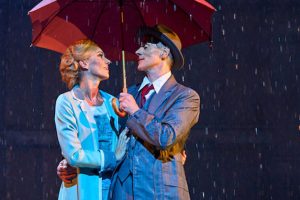
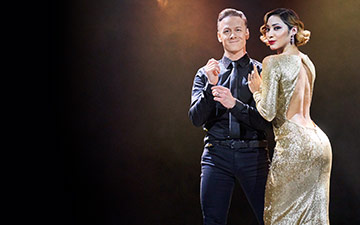


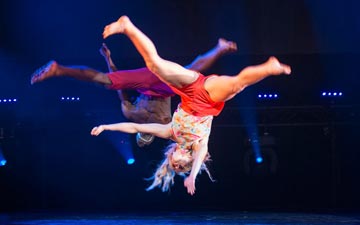
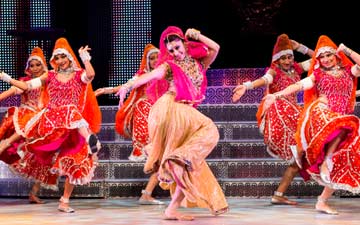
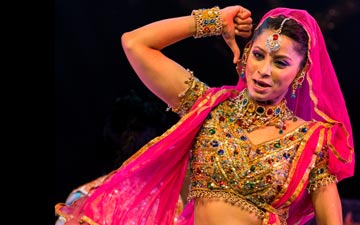
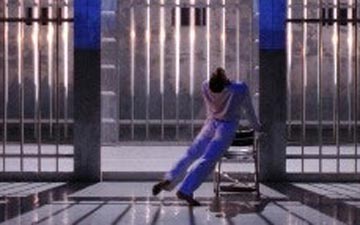

You must be logged in to post a comment.